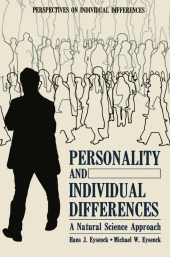 Neuerscheinungen 2012Stand: 2020-01-07 |
Schnellsuche
ISBN/Stichwort/Autor
|
Herderstraße 10
10625 Berlin
Tel.: 030 315 714 16
Fax 030 315 714 14
info@buchspektrum.de |

Michael Eysenck
Personality and Individual Differences
A Natural Science Approach
1985. 2012. xviii, 452 S. 3 SW-Abb. 229 mm
Verlag/Jahr: SPRINGER, BERLIN; SPRINGER US; SPRINGER 2012
ISBN: 1-461-29470-3 (1461294703)
Neue ISBN: 978-1-461-29470-2 (9781461294702)
Preis und Lieferzeit: Bitte klicken
This book presents an introduction to the study of personality and indi vidual differences, but it is not a textbook in the usual sense. As we shall point out in some detail later, typically textbooks on personality and individual differences either deal with statistical and psychometric prob lems, methodology, and the technical issues of measurement, or else they present the different theories of personality associated with various authors such as Maslow, Cattell, Freud, Jung, Murray, Rogers, Rotter, or to whomever the various eponymous chapters may be dedicated. The the ories are presented, together with a brief mention of some empirical studies, but the student is not enlightened as to the weight to be given to the supporting evidence, nor is any comparison attempted between the different theories, formulating judgments regarding completeness, cri teria adopted, or validity in terms of experimental proof. It is small wonder that philosophers of science have concluded that the social sciences, unlike the "hard" sciences, suffer from the lack of a paradigm (Kuhn, 1970); this defect is more noticeable, perhaps, in the study of personality and individual differences than in any other part of psychology (except perhaps in clinical and abnormal psychology, where an equal lack of consensus rules).
One: Descriptive.- One The Scientific Description of Personality.- Personality and Taxonomy: The Problem of Classification.- Type and Trait Theories: The Modern View.- Type-Trait Theories and Factor Analysis.- Situationism versus Type-Trait Theories.- Two The Development of a Paradigm.- Origins of Personality Theory.- The Beginnings of Modern Research.- Psychoticism as a Dimension of Personality.- Impulsiveness and Sensation Seeking: A Special Case.- The Question of Validity.- Three The Universality of P, E, and N.- Genetic Factors.- Personality in Animals.- Cross-cultural Studies.- Longitudinal Studies of Personality.- Four Alternative Systems of Personality Description.- R.B. Cattell and 16PF.- The Guilford-Zimmerman Factors.- The NEO Model of Personality.- The Minnesota Multiphasic Personality Inventor.- The California Psychological Inventory.- The Edwards Personal Preference Schedule and the Jackson Personality Research Form.- Other Systems.- Summary.- Five The Cognitive Dimension: Intelligence as a Component of Personality.- Galton versus Binet: IQ and Reaction Time.- The Psychophysiology of Intelligence.- The Theory of Intelligence.- Six Summary and Conclusions.- Two: Causal.- Seven Theories of Personality and Performance.- H. J. Eysenck (1957).- H. J. Eysenck (1967a).- Gray´s Theory.- Brebner´s Theory.- Eight The Psychophysiology of Personality.- Theoretical Background.- Extraversion.- Neuroticism.- Theoretical Implications.- Nine Extraversion, Arousal, and Performance.- Conditioning.- Sensitivity to Stimulation.- Vigilance.- Verbal Learning and Verbal Memory.- Psychomotor Performance.- Perceptual Phenomena.- Conclusions.- Ten Neuroticism, Anxiety, and Performance.- The State-Trait Approach.- Theories of Anxiety and Performance.- Worry and Performance.- Efficiency and Effectiveness.- Anxiety ? Task Interactions.- Attentional Mechanisms.- Learning and Memory.- Conclusions.- Eleven Social Behavior.- Social Interaction.- Sexual Behavior.- Educational Achievement.- Occupational Performance.- Antisocial Behavior and Crime.- Psychiatric Disorders.- Conclusions.- Three: Epilogue.- Twelve Is There a Paradigm in Personality Research?.- References and Bibliography.- Author Index.


